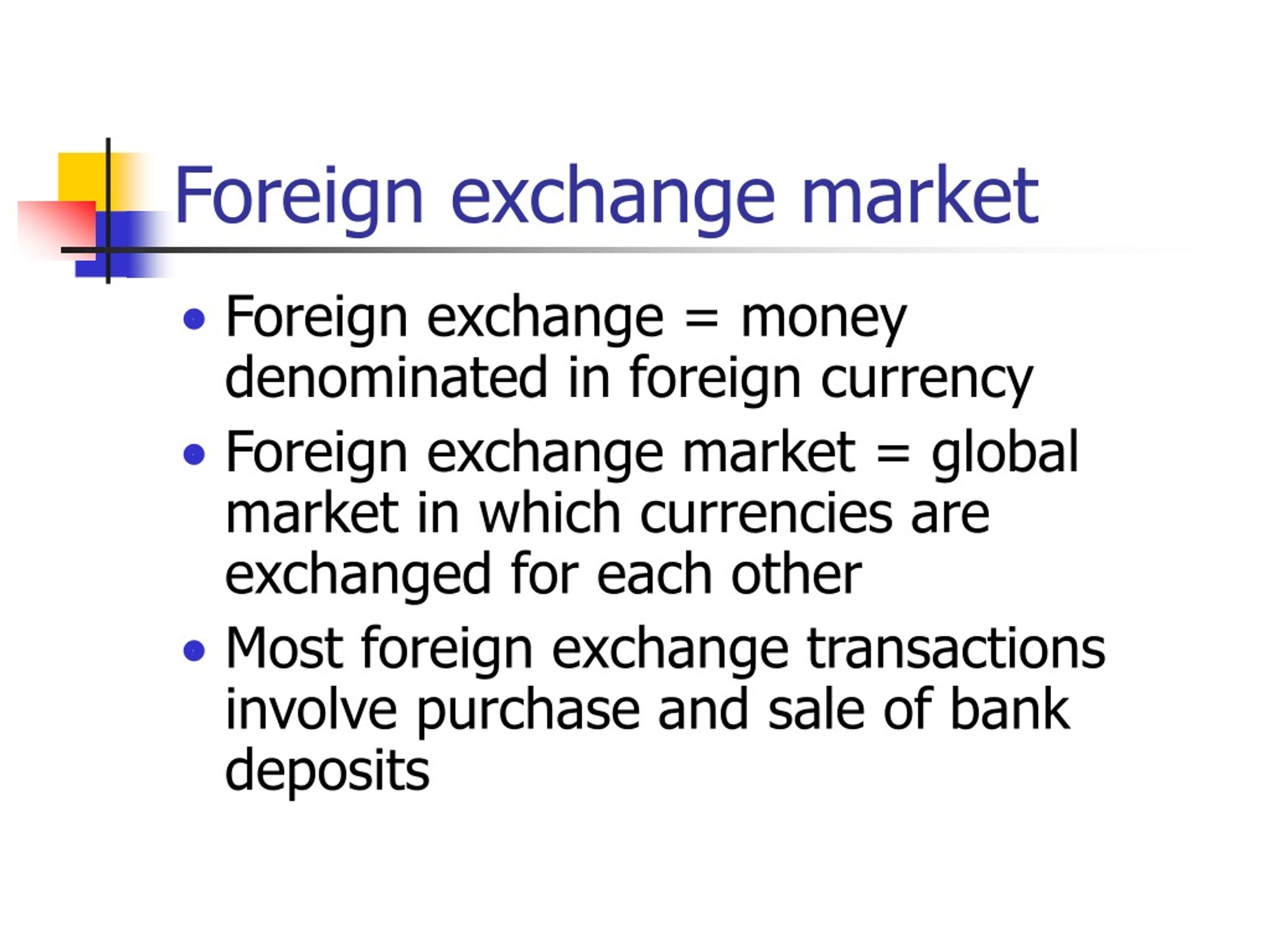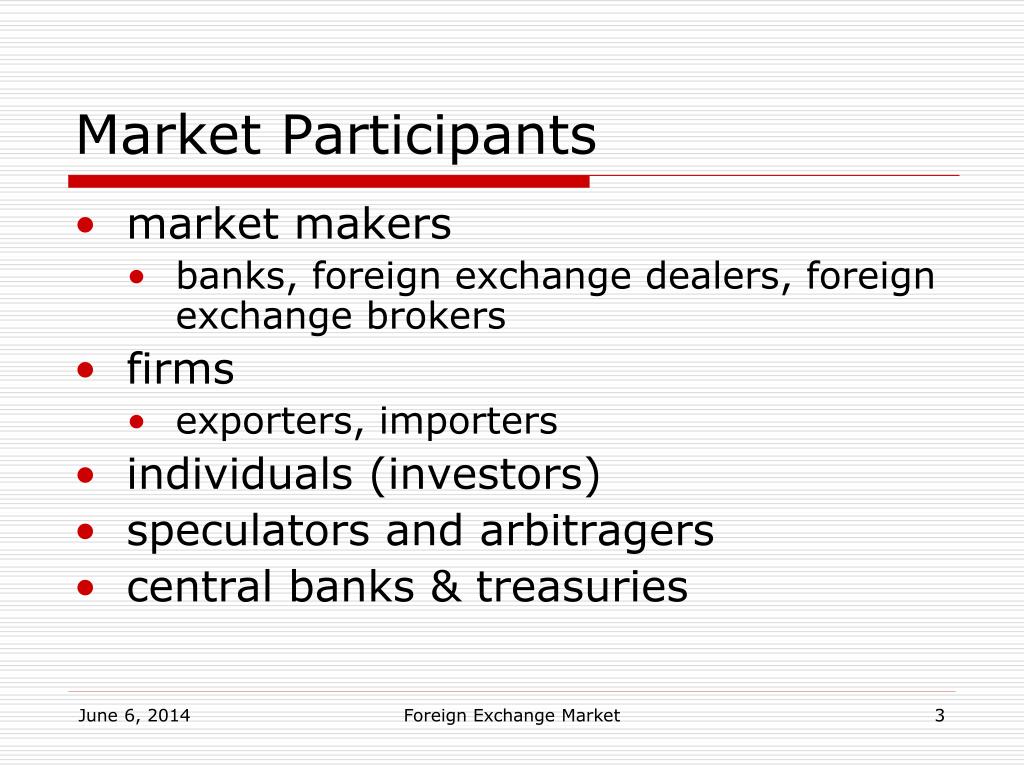Foreign exchange market participants exporters importers brokers local retailers - In the dynamic world of global trade, foreign exchange market participants play a pivotal role in facilitating transactions across borders. From exporters who send goods and services abroad to importers who bring them in, brokers who connect buyers and sellers, and local retailers who cater to international customers, each player contributes to the intricate tapestry of the foreign exchange market.
Understanding the roles and interactions of these participants is crucial for businesses and individuals seeking to navigate the complexities of international trade and currency exchange.
Exporters: Foreign Exchange Market Participants Exporters Importers Brokers Local Retailers
 Exporters play a crucial role in the foreign exchange market by facilitating the sale of goods and services from one country to another. They bridge the gap between domestic producers and international buyers, contributing to global trade and economic growth. Exporters typically engage in trading a wide range of goods and services, including raw materials, manufactured products, agricultural commodities, and financial assets. They source these goods from domestic suppliers and negotiate with foreign buyers to arrange sales and shipments. Major exporting countries include China, the United States, Germany, Japan, and South Korea. China is known for its exports of electronics, textiles, and machinery, while the United States primarily exports agricultural products, aircraft, and vehicles. Germany is a leading exporter of automobiles, machinery, and chemicals, and Japan specializes in electronics, vehicles, and industrial equipment. South Korea's key exports include electronics, semiconductors, and automobiles.
Exporters play a crucial role in the foreign exchange market by facilitating the sale of goods and services from one country to another. They bridge the gap between domestic producers and international buyers, contributing to global trade and economic growth. Exporters typically engage in trading a wide range of goods and services, including raw materials, manufactured products, agricultural commodities, and financial assets. They source these goods from domestic suppliers and negotiate with foreign buyers to arrange sales and shipments. Major exporting countries include China, the United States, Germany, Japan, and South Korea. China is known for its exports of electronics, textiles, and machinery, while the United States primarily exports agricultural products, aircraft, and vehicles. Germany is a leading exporter of automobiles, machinery, and chemicals, and Japan specializes in electronics, vehicles, and industrial equipment. South Korea's key exports include electronics, semiconductors, and automobiles. Importers

Importers play a crucial role in the foreign exchange market by facilitating the purchase of goods and services from foreign countries. They bridge the gap between domestic consumers and international suppliers, ensuring a steady flow of products and services across borders.
Expand your understanding about foreign exchange market meaning marathi with the sources we offer.
Importers typically purchase a wide range of goods and services, including raw materials, manufactured products, and consumer goods. These imports are essential for meeting domestic demand and complementing local production capabilities.
Understand how the union of foreign exchange market objectives can improve efficiency and productivity.
Major Importing Countries and Primary Import Products, Foreign exchange market participants exporters importers brokers local retailers
- United States: Machinery, vehicles, electronics, oil, and pharmaceuticals
- China: Machinery, oil, soybeans, iron ore, and copper
- Germany: Machinery, vehicles, chemicals, pharmaceuticals, and electronics
- Japan: Machinery, vehicles, electronics, oil, and natural gas
- United Kingdom: Machinery, vehicles, electronics, oil, and chemicals
Brokers
Brokers play a crucial role in facilitating foreign exchange transactions by connecting buyers and sellers and ensuring the smooth execution of trades. They provide liquidity to the market and help determine exchange rates.
Learn about more about the process of journal on foreign exchange market in the field.
There are different types of brokers operating in the market, each catering to specific needs of clients. Some of the major types include:
Retail Brokers
- Target individual traders and small businesses
- Offer user-friendly platforms and educational resources
- Typically charge spreads or commissions on trades
- Examples: Forex.com, Oanda, IG
Wholesale Brokers
- Deal with large financial institutions and corporations
- Provide direct access to interbank liquidity
- Charge fees based on transaction volume
- Examples: EBS, Reuters, Bloomberg
Electronic Communication Networks (ECNs)
- Automated trading platforms that match buy and sell orders
- Offer anonymity and reduced transaction costs
- Examples: Currenex, FXall
Local Retailers
Local retailers play a crucial role in the foreign exchange market, primarily by facilitating the exchange of currencies for individuals and businesses within their communities.
Local retailers impact the demand for foreign currencies by providing convenient access to currency exchange services. They cater to a diverse customer base, including tourists, international students, and businesses engaged in cross-border transactions.
Examples of Local Retailers
- Currency exchange bureaus: These specialized businesses offer currency exchange services, often with competitive rates and convenient locations.
- Banks: Many banks have local branches that provide currency exchange services to their customers, along with other financial services.
- Post offices: In some countries, post offices offer currency exchange services as part of their broader range of services.
- Supermarkets and department stores: Some large retail chains offer currency exchange services as an additional convenience to their customers.
Final Thoughts

In conclusion, the foreign exchange market is a complex ecosystem where exporters, importers, brokers, and local retailers form a cohesive network. Their diverse functions and interconnectedness drive the flow of goods, services, and currencies across borders, shaping global economic dynamics and fostering international cooperation.
